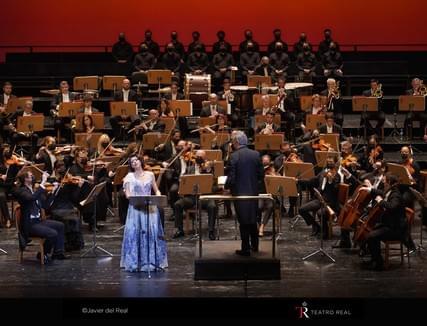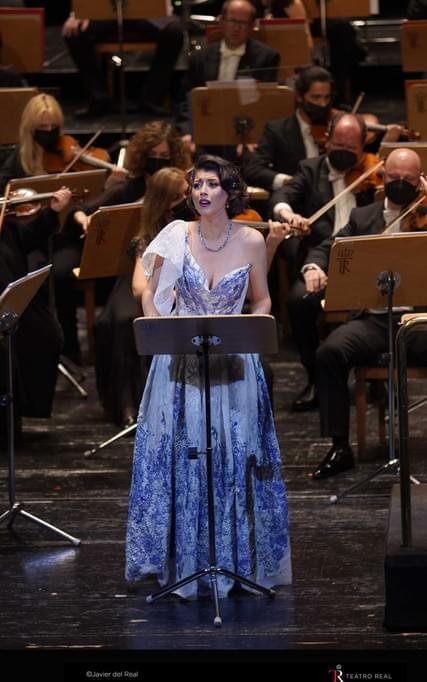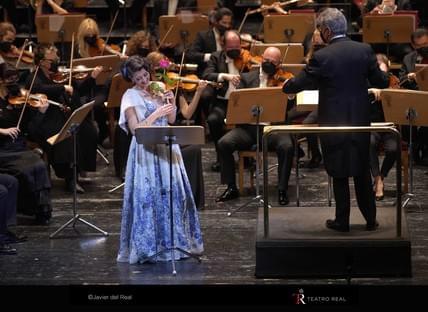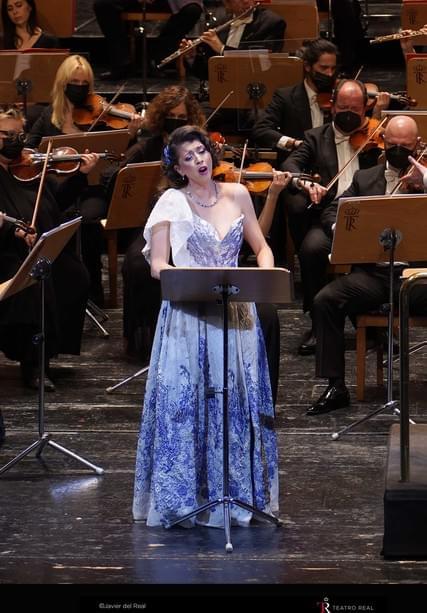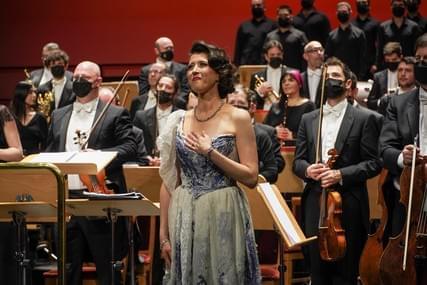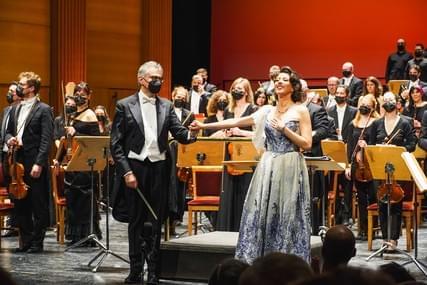Voces del Real
About
Fragments from the operas Guillaume Tell, Le siège de Corinthe, Le Comte Ory by Gioacchino Rossini, and Les Martyrs, Lucie de Lammermoor, La favorite and La Fille du Régiment by Gaetano Donizetti.
PROGRAM
First Part
Ils s’éloignent enfin...Sombre forêt - Guillaume Tell
Ouverture - Le siège de Corinthe
L’heure fatale approche...Juste ciel! - Le Siège de Corinthe
En proie à la tristesse...Céleste providence - Le Comte Ory
Second Part
O ma mère, ma mère...Qu'ici ta main glacée bénisse ton enfant - Les Martyrs
Que n'avons nous des ailes - Lucie de Lammermoor
Ouverture - La Favorite
C'en est donc fait...Par le rang...Salut à la France! - La Fille du Régiment
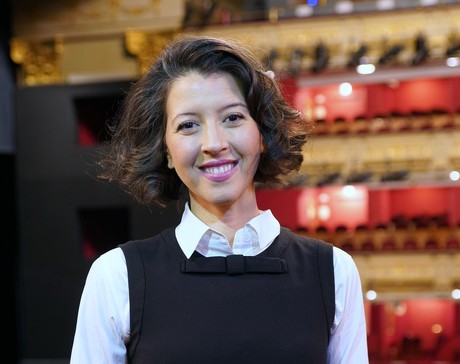
Teatro Real Grandes Voces Concert Press
Articles about Lisette's upcoming concert in Madrid

Interview - RTVE.es
Lisette speaks to RTVE.es about her upcoming performances in Spain

Interview - El Español
Lisette is interviewed by El Español

❄️ Lisette's Winter Newsletter!
Milan, Chicago, Valencia, Vienna, Madrid
Reviews
Lisette Oropesa triunfa en su esperado regreso al Teatro Real
De su ópera Les Martyrs estrenada en Paris en 1840, probablemente de sus menos conocidas o representadas, Oropesa interpretaba un aria oscura “O ma mère, ma mère...Qu'ici ta main glacée bénisse ton enfant”, de un belcantismo al límite, a la vez que apropiado para exhibir unas dotes registros agudos y extraordinaria agilidad que requieren no solo técnica o eficacia, sino una suerte de don. Eso sí, intensamente trabajado.From his opera Les Martyrs, premiered in Paris in 1840, probably among his least known or performed works, Oropesa was interpreting a somber aria, “O ma mère, ma mère...Qu'ici ta main glacée bénisse ton enfant", exhibiting bel canto at its extreme, while also suitable for showcasing high register skills and extraordinary agility that require not just technique or proficiency, but a sort of gift. That said, intensely honed.— Alicia Huerta • Republica
Je suis Lisette Oropesa (et j’habite au Teatro Real)
La soprano tiene todo lo necesario para ser la gran diva y dama de la ópera que es. Aquí lo sabemos desde aquella histórica Traviata, cuando se convirtió en la primera mujer en bisar en el Teatro Real. Una función que, además, hizo que todos los ojos de la lírica mundial mirasen a Madrid, porque todos los demás teatros del planeta seguían cerrados tras el confinamiento.The soprano has everything it takes to be the grand diva and lady of the opera that she is. Here, we've known this since that historic Traviata, when she became the first woman to be encored at the Teatro Real. A performance that, moreover, turned all eyes of the global lyric world towards Madrid, because all other theaters on the planet remained closed after the lockdown.— Nacho Fresno • Shangay
MADRID / Lisette Oropesa: su peso en oro
ropesa desgranó una Sombre forêt desplegando lirismo, elegancia y las exigencias requeridas en su predominante escritura silábica, efectuando los encantadores saltos de octava (la guinda del pastel canoro) con impecable precisión y remate. La plegaría de Pamyra en Le siège de Corinthe exige otros recursos expresivos, y Oropesa se dejó llevar por la sublime melodía con un pulcrísimo canto legato, dando al mismo tiempo el necesario contenido emocional. Una delicia que destacó el valor de la página.Oropesa meticulously portrayed a "Sombre forêt" displaying lyricism, elegance, and the requirements demanded in her predominant syllabic writing, carrying out the delightful octave jumps (the cherry on the song’s cake) with impeccable precision and finish. The prayer of Pamyra in "Le siège de Corinthe" requires other expressive resources, and Oropesa let herself be carried away by the sublime melody with an extremely pure legato singing, delivering at the same time the necessary emotional content. A delight that highlighted the value of the piece.— Fernando Fraga • Scherzo Magazine
REVIEW: LISETTE OROPESA AT THE ROYAL THEATER
Habiendo debutado en 2007, todavía conserva completamente las características de soprano ligera, si bien goza de un apreciable volumen y proyección -la voz «corre» sin problemas- y es muy homogénea de arriba abajo, utilizando también adecuadamente el canto de pecho -con las limitaciones propias de su extensión natural-, pudiendo así abordar sin problemas los registros más «graves». También contribuyen determinantemente a su atractivo su capacidad de matización, la inteligente utilización de las medias voces -posee un centro bien resuelto-, y una muy buena dicción y administración del fiato, que le permiten frasear y moldear a conciencia su canto legato. Además creemos que su canto en idioma francés es muy correcto.Having debuted in 2007, she still fully retains the characteristics of a light soprano, albeit enjoying an appreciable volume and projection - her voice "carries" without any issues - and is very homogeneous from top to bottom, also properly using chest voice - with the limitations inherent in its natural range - and thus being able to tackle the more "bass" records without problems. Her ability to add nuances, the intelligent use of middle voices - she possesses a well-resolved center - and a very good diction and management of breath, which allow her to phrase and shape her legato singing consciously, also significantly contribute to her appeal. In addition, we believe her singing in French is very correct.— Oscar del Saz • Codalario
Esperado éxito de Lisette Oropesa en Teatro Real
Comenzó la primera parte, asignada a Rossini, con “Ils s’éloignent enfin… Sombre forêt”, de Guillaume Tell. De líneas más líricas para ir calentando motores, destacó por los hermosos y largos fraseos que su fiato permitía. Tampoco estuvo falta de exquisitas dinámicas que le permitían ir del piano a un forte sin grandes alardes para ofrecer su faceta más expresiva.The first part, dedicated to Rossini, began with "Ils s'éloignent enfin… Sombre forêt" from Guillaume Tell. Featuring more lyrical lines to start warming up, it stood out for the beautiful and lengthy phrasing that their breath control allowed. It also featured exquisite dynamics, enabling a shift from piano to forte without much ostentation to showcase its most expressive facet.— María Pardo • Opera World
Lisette Oropesa en Madrid
Pero la ovacionada aún nos tenía reservadas dos “propinas”, donde mostró toda su gracia y buen hacer que la han convertido en una de las sopranos de referencia del panorama internacional. Meyerbeer (‘Robert, toi que j’aime’ de Robert le diable) y Verdi (‘Merci jeunes amies’ de Les vêpres siciliennes) resultaron ser lo mejor de la noche. Oropesa no defraudó y el público aplaudió a rabiar.But the cheered singer still had two "encores" for us, where she showcased all the grace and skill that have turned her into one of the leading sopranos in the international scene. Meyerbeer ('Robert, toi que j’aime' from Robert le diable) and Verdi ('Merci jeunes amies' from Les vêpres siciliennes) turned out to be the best of the night. Oropesa did not disappoint and the crowd applauded furiously.— Pro Opera • Pro Opera
Crítica / Chispeante Oropesa
Lisette Oropesa es una cantante muy querida en Madrid y con razón; posee una voz lirica ligera bellísima, canta con un excelente gusto, frasea de forma exquisita, sus agudos son limpios y rutilantes, tiene una escuela canora impecable, sobre todo para el canto legato y, además, posee un encanto capaz de meterse a cualquier público en el bolsillo. Su fulgurante carrera ahora está en un excelente momento aunque la soprano ya se prepara para cuando su voz ensanche y tenga que abordar repertorio más pesado.Lisette Oropesa is a beloved singer in Madrid and rightfully so; she possesses a beautifully light lyrical voice, sings with excellent taste, phrases exquisitely, her high notes are clean and sparkling, she has a flawless vocal technique, especially for legato singing, and, in addition, she has a charm capable of winning any audience over. Her dazzling career is currently at a peak, although the soprano is already preparing for when her voice matures and she needs to tackle heavier repertoire.— Francisco Villalba • Ritmo
Una prima donna moderna y encantadora
Lisette Oropesa es una artista muy notable, que dispone de una voz de soprano lírica abundante y rica que ella maneja con dominio y habilidad, tal vez más adecuada, por caudal y densidad, para los papeles dramáticosLisette Oropesa is a highly remarkable artist, possessing an abundant and rich lyric soprano voice that she controls with mastery and skill, perhaps more suited, due to its volume and density, for dramatic roles.— Álvaro Del Amo • El Mundo



